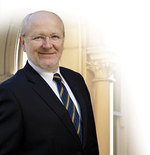Thinking globally
There's more cooperation and collaboration between universities than you might think. While universities are often in competition for students and funding, there are a vast number of ways in which we work together. At a State level, a range of collaborative agreements exist across various programs in teaching, research and the use of facilities. At a national level, the University of Adelaide is a member of the prestigious Group of Eight (Go8) Australian universities, which has its own level of cooperation for the benefit of each of its members. But there are also bigger, broader levels of collaboration. Being a university in the Commonwealth, the University of Adelaide is - as most Australian universities are - part of the Association of Commonwealth Universities (ACU). As the Honorary Treasurer of the ACU, I was pleased to be invited attend the recent Conference of Commonwealth Education Ministers held in Kuala Lumpur, Malaysia and to deliver a plenary address on The Role of Universities in Shaping Our Understanding of Sustainability Issues: Climate Change. The conference brings together university and government representatives from right across the Commonwealth to discuss important issues in higher education. The event helps to develop a closer working relationship between universities as well as with key decision-makers in higher education policy. One of the features of this year's conference was a University Vice-Chancellors' Forum, which enabled vice-chancellors to develop a series of comments and recommendations to Education Ministers. It's important to point out that the Commonwealth is a mixed bag: there are major differences between universities in developed and developing countries, with each country facing various economic pressures, and each with a varying quality of higher education service and delivery. Despite these differences, the vice-chancellors developed a statement that presented a very clear and coherent message to education Ministers: a greater commitment is needed to university-level education right across the globe. By way of context, the United Nations has developed eight "Millennium Development Goals" relating to key issues faced by the world. These range from halving the level of world poverty, to halting the spread of HIV/AIDS and providing universal education, all by the target date of 2015. From our discussions in the Vice-Chancellors' Forum, we were broadly convinced that none of the UN's proposed Millennium Development Goals could be achieved without a thriving higher education system. The essential role of higher education in reaching not only these goals but also other key issues for society - such as sustainable economic development - must be acknowledged by all governments. In doing this, governments must take a holistic view of education, moving primary, secondary, tertiary and lifelong education forward together. If you look at the education sector as a whole, there's no doubt that the biggest benefit to economies comes from university education. University teaching, learning and research is a major driver for change across all aspects of our lives. These are fundamental issues for governments to consider and acknowledge. At the Forum, vice-chancellors called upon education Ministers to foster a strong and sustainable university sector by: - "Ensuring that there are appropriate processes for accreditation of universities, as governments have a responsibility to remove bogus universities and to protect students and the public;
- "Ensuring that universities have access to adequate funding for teaching, research and community engagement. It is particularly important that funding per student is not damagingly diminished as a result of the expansion of student numbers;
- "Maintaining the appropriate balance between university autonomy and public accountability."
Adequate funding of higher education and creating a sustainable sector is crucial not just to our own State and nation but to the world generally. While it's true that we are all, in one sense, competing for students and resources, improving the quality and sustainability of universities means that society as a whole stands to benefit greatly. PROFESSOR JAMES A. McWHA
Vice-Chancellor and President
|





